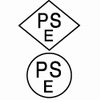Approved standards
- 2011-08-10 21:41:17
-

PSE Standard profile, PSE Approval
Japan PSE certification
More and more countries joined the WTO, to protect their own industries and markets, many countries have enacted relevant laws and regulations, the technical specifications of the imported goods for the restrictions, technical barriers to the formation, so that products with safety, environmental protection and compatibility , while limiting the import of products - Japan is such a complex national security system.
In 1995, Japan enacted a new law to ban the product, the new regulations no longer follows the principle of error-party liability, while the use of the practice in Europe and North America (the principle of fault-party liability), provided the responsible party for the safety of the product manufacturers, import Manufacturers, distributors and so on.
April 1, 2001 until the Japanese electrical and Material Control Law (DENTORI) will control the products are divided into A, B two categories, of which, A class including 165 kinds of products, mainly in the power cord, fuses, switches, transformers , ballast, etc.; B class, including 333 kinds of products, mainly lighting, household appliances, office equipment. A mandatory products must obtain government certification that the T mark and the mark only by the MITI (MITI) issued. Class B compliance products or applications are required to do self-proclaimed third-party certification, for example, the S TUV Rheinland marked signs.
After 1 April 2001, electrical and Material Safety Law (DENAN) replaced DENTORI law, while Japan also abolished the T flag, a certificate issued by the government no longer directly, but to authorize a third party product certification bodies for conformity assessment test.
New regulations will be the product into "a particular class of electrical appliances and materials" and "non-specific electrical and material class." The "specific type of electrical appliances and materials," including a total of 112 kinds of products; "non-specific category of electrical appliances and materials", contains 340 products. To enter the Japanese market "specific electrical and material type" products must obtain third-party certification mark PSE (diamond) mark; "non-specific electrical and material class" products or applications are required to do self-proclaimed third-party certification mark PSE (round ) logo.
The new law reduced the number of categories of products, more products are classified as "non-classified products", no longer constrained by DENAN, and some previously classified as "A class" product has been classified as "Specific electrical appliances and materials class."
Japan's electrical products market is large, the Japanese consumer electrical product safety very seriously. From April 1, 2001, Japan "Electrical Products Control Act (DENTORI)" was renamed "Electrical Appliance and Material Safety Law (DENAE)", unity with PSE mark, and to strengthen penalties for importers.
PSE (Product Safety of Electrical Appliance & Materials) certification (in Japan called "fit check") is the mandatory Japanese electrical goods market access system, in Japan, "Electrical Appliance and Material Safety Law" provides an important element . Currently, the Government of Japan Japan, "Electrical Appliance and Material Safety Law" stipulates that the electrical supplies are divided into "specific electrical supplies" and "non-specific electrical supplies," in which "specific electrical appliances," including 115 kinds of products; "non-specific electrical supplies." including 338 kinds of products. PSE includes two EMC and safety requirements. Where a "specific electrical items" directory of products into the Japanese market, must be authorized by the Japanese Ministry of Economy of third-party certification bodies, to obtain a certificate of authentication, and a diamond on the label PSE mark, as shown below:
CQC only apply in China as Japan PSE certification accredited certification bodies, in February 2007, will formally submit the application materials to the Japanese Ministry of Economy. In March, Japan's METI to send NITE agency assessors PSE group of CQC-site assessment for a three-day on-site audits, review the operation of experts on the standardization of CQC and serious working attitude expressed admiration for the technical engineer give a high level of professionalism and evaluation, and that CQC is the world's leading certification body, on-site assessment is not aware of any nonconformance or observation items, ultimately with "zero defect" conclusion through a review of the CQC.
April 23, 2007, the Japanese Ministry of Economy No. 129 bulletin released by the Japanese METI Minister signed an order officially authorized by China Quality Certification Center (abbreviation CQC) Japan PSE undertake compulsory product certification, thus, CQC become the UL, TUV and other international renowned certification body after the fourth by the Japanese government authorized foreign certification bodies.
Currently, CQC obtained Japan PSE certification of product categories ranging from three categories:
Wire and cable (including 20 kinds of products), wiring apparatus (electrical accessories, lighting, appliances, etc.) (including 38 kinds of products), electric power applications in mechanical appliances (appliances) (includes 12 products).More information from the Office of General Ningbo Qiaopu Electric Co., Ltd.
- Previous [Return Home] [Print] [Go Back] Next
Products Search
Contact Us
Contact Person:
Gavi ChenTel:
+86-0574-62166266- +86-15888180299
Fax:
+86-0574-62179799E-mail:
gavi@plug9.com




